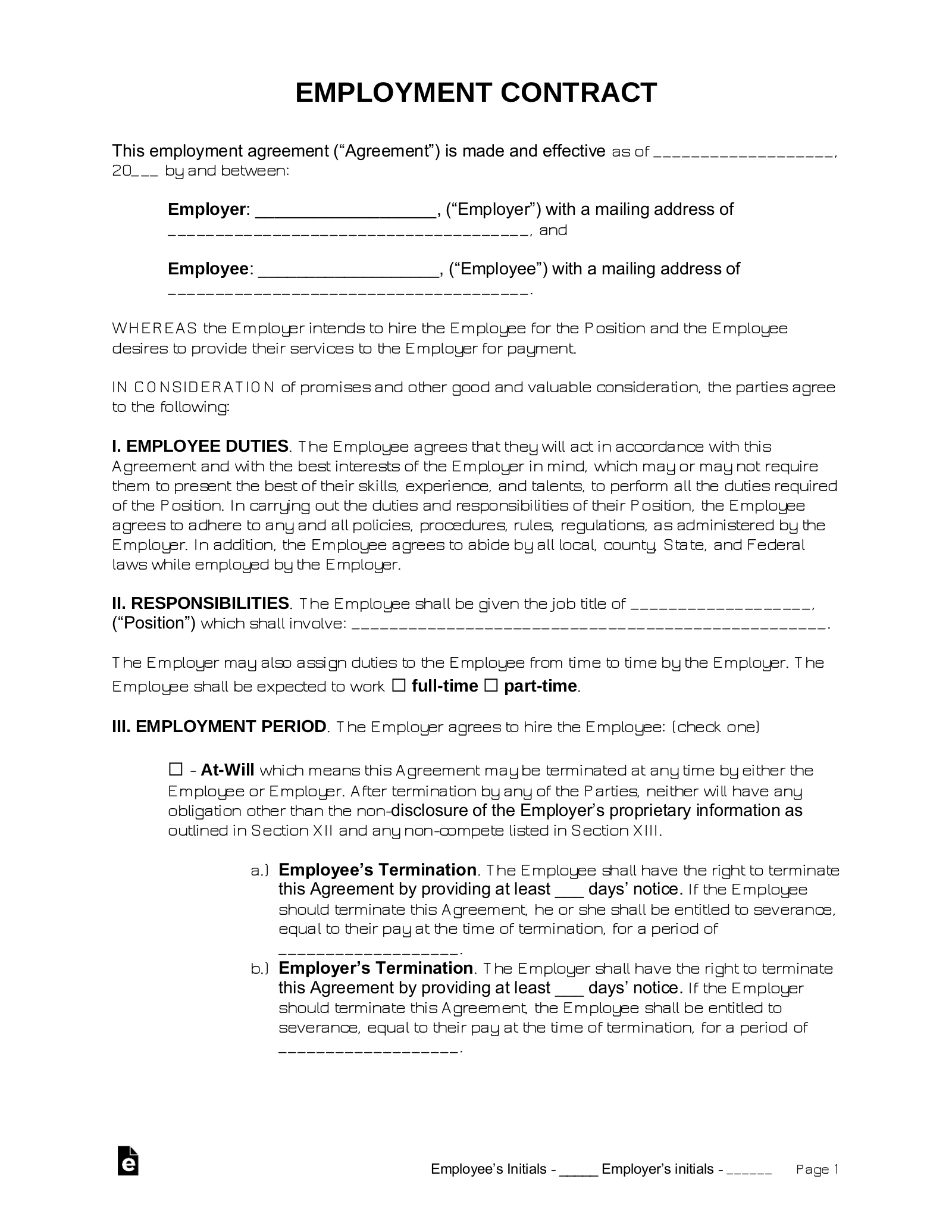Employment Contracts
by Admin
Posted on 14-03-2025 10:33 AM

Importance of Employment Contracts
Employment contracts are essential for both employers and employees, as they provide a clear understanding of the employment relationship and help prevent misunderstandings. A written Employment Contracts can help establish the employer's expectations, job requirements, and company policies, while also protecting the employee's rights and interests. Furthermore, employment contracts can help prevent disputes and lawsuits by providing a clear framework for resolving conflicts and terminating employment.
Key Components of Employment Contracts
A typical employment contract includes several key components, such as job description, compensation and benefits, termination procedures, and confidentiality agreements. The job description outlines the employee's responsibilities, duties, and performance expectations, while the compensation and benefits section specifies the employee's salary, bonuses, and benefits, such as health insurance and retirement plans. The termination procedures section outlines the circumstances under which employment can be terminated, including notice periods, severance pay, and termination fees.
Types of Employment Contracts
There are several types of employment contracts, including permanent, temporary, and contract employment agreements. Permanent employment contracts are used for full-time employees, while temporary employment contracts are used for short-term or seasonal workers. Contract employment agreements, on the other hand, are used for independent contractors or freelancers who work on a project-by-project basis.
Negotiating Employment Contracts
Negotiating an employment contract can be a challenging and intimidating process, especially for employees who are new to the job market. However, it is essential to carefully review and negotiate the terms of the contract to ensure that they are fair and reasonable. Employees should pay close attention to the compensation and benefits section, as well as the termination procedures section, to ensure that they are protected in case of job loss or termination.
Best Practices for Creating Effective Employment Contracts
Creating an effective employment contract requires careful planning, attention to detail, and a thorough understanding of employment laws and regulations. Employers should ensure that the contract is clear, concise, and easy to understand, and that it includes all the necessary components, such as job description, compensation and benefits, and termination procedures. Additionally, employers should ensure that the contract is fair and reasonable, and that it complies with all relevant employment laws and regulations.
Using Clear and Concise Language
Using clear and concise language is essential when creating an employment contract. The contract should be easy to understand, and it should avoid using technical jargon or complex legal terminology. Employers should use simple and straightforward language to explain the terms and conditions of employment, and they should ensure that the contract is free from ambiguity and confusion.
Including Essential Components
An employment contract should include all the necessary components, such as job description, compensation and benefits, and termination procedures. The contract should also include any other essential terms and conditions, such as confidentiality agreements, non-compete clauses, and intellectual property agreements. Employers should ensure that the contract is comprehensive and thorough, and that it covers all aspects of the employment relationship.
Employment Contract Laws and Regulations
Employment contract laws and regulations vary from country to country, and even from state to state. Employers must ensure that their employment contracts comply with all relevant laws and regulations, including minimum wage laws, overtime laws, and anti-discrimination laws. Employers should also be aware of any specific laws and regulations that apply to their industry or sector, such as laws governing employee safety, health, and welfare.
Common Mistakes to Avoid
When creating an employment contract, there are several common mistakes to avoid. One of the most common mistakes is failing to include essential components, such as job description, compensation and benefits, and termination procedures. Another common mistake is using unclear or ambiguous language, which can lead to confusion and disputes. Employers should also avoid including unlawful or unenforceable terms, such as non-compete clauses that are too broad or restrictive.
Conclusion
In conclusion, employment contracts are a crucial aspect of the employer-employee relationship, and they play a vital role in preventing disputes and ensuring a smooth working relationship. Employers should ensure that their employment contracts are clear, concise, and comprehensive, and that they comply with all relevant laws and regulations. By following best practices and avoiding common mistakes, employers can create effective employment contracts that protect their interests and those of their employees.
FAQs
What is an employment contract?
An employment contract is a written agreement between an employer and an employee that outlines the terms and conditions of employment, including job responsibilities, compensation, benefits, and termination procedures.
What are the key components of an employment contract?
The key components of an employment contract include job description, compensation and benefits, termination procedures, and confidentiality agreements.
Can an employment contract be negotiated?
Yes, an employment contract can be negotiated, and employees should carefully review and negotiate the terms of the contract to ensure that they are fair and reasonable.
What are the consequences of not having an employment contract?
Not having an employment contract can lead to disputes and confusion, and it can also leave employers and employees vulnerable to lawsuits and legal action.
How often should an employment contract be reviewed and updated?
An employment contract should be reviewed and updated regularly, ideally every 6-12 months, to ensure that it remains relevant and effective.
What is the difference between a permanent and temporary employment contract?
A permanent employment contract is used for full-time employees, while a temporary employment contract is used for short-term or seasonal workers.
Odom Law Group
24801 Pico Canyon Road
Suite 100 & 300
Santa Clarita, CA 91381
(661) 367-1699
